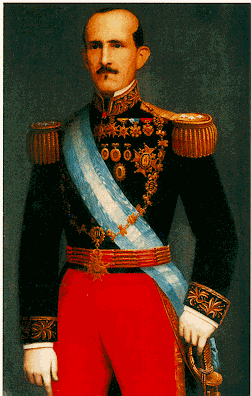<Back to Index>
- Mathematician Aleksandr Yakovlevich Khinchin, 1894
- Painter Edgar Degas, 1834
- Founder of the Republic of Ecuador Juan José Flores y Aramburu, 1800

Juan José Flores y Aramburu (July 19, 1800 – October 1, 1864) was a Venezuelan military general who became Supreme Chief, and later the first President of the new Republic of Ecuador. He later served two more terms from 1839 to 1843 and from 1843 to 1845, and is often referred to as "The founder of the Republic".
Flores was born in Puerto Cabello, Venezuela. He married Mercedes Jijón de Vivanco y Chiriboga in 1824, and one of their 12 children, Antonio, became president of Ecuador in 1888.
On May 13, 1830, the day of Ecuador's breaking away from Gran Colombia, he was named supreme chief of the new country, and then on August 14, 1830, he was named provisional president. His official term, however, did not start until September 22, 1830, 11 days after he was elected constitutional president by the assembly in Riobamba. That term lasted until September 10, 1834, and was marked with much turmoil. Flores faced a rebellion led by Luis Urdaneta, a loyalist of Simón Bolívar, who wanted to prevent Ecuador from leaving Gran Colombia. Flores also faced a threat from a member of the Ecuadorian congress, Vicente Rocafuerte, who attempted to overthrow him. Eventually, the two made an agreement – Rocafuerte would become president after Flores, and Flores would become leader of the military. Also during his term, he fought an invading Colombian army in 1832 and again starting in 1834, finally defeating them on January 18, 1835, in Miñarica, near Ambato.
Flores' second term began on February 1, 1839, and ended January 15, 1843. The beginning of his term was marked by peace and social development — he kept his word to rule justly and to defend freedom. However, in the last year of his term, he intervened militarily in the politics of Nueva Granada at the request of the Colombian government, fighting his old enemy, José María Obando. When later forced to intervene again, he was attacked by the Colombian army and his popularity at home fell. Then, after irregularities in the elections of 1842, he pushed to have the 1835 constitution annulled, and the new constitution, nicknamed the "Carta de la esclavitud" ("letter of slavery") allowed him to continue in power for a third term, which began April 1, 1843. During this term, Flores fought to remain in power, but was ultimately overthrown on March 6, 1845, by a rebellion led by Rocafuerte and Vicente Ramón Roca, the man who became the next president of Ecuador.
Flores died of uremia in 1864 while in house arrest under the presidency of Gabriel García Moreno.